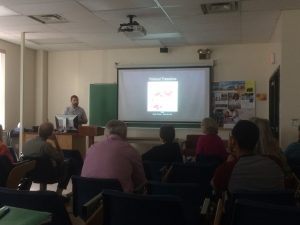BY: Brianna Zichettella
Nick Mullins, a former coal miner, discussed human and environmental exploitation by the Appalachian coal industry earlier this month.
The presentation, given as part of Mullins’ “Coal, Climate, & Environmental Backlash” tour, focused on the transition of Appalachia from a place known for labor rights advocacy to a corporate-controlled, environmentally and economically devastated region.
“I didn’t know much about the coal industry before this lecture,” said Gabby Sinnott, a history and political science junior present at the talk. “I knew how it impacted the environment, but I didn’t know about the repercussions it had on the workers and their families.”

Through methods like mountaintop removal and filling-in of valleys and streams with the resulting rubble, the coal industry irreparably damages the geography of Appalachia.
Worse, Mullins says, coal mining companies’ methods often end up polluting local land and water with slurry, a toxic byproduct of the mining process.
The human cost is also high. According to Mullins, accidents and illnesses from working in the mines are common, and 11,000 more deaths, including those who do not work in the mines, occur in mining areas than are recorded in non-mining areas.
Those who live in Appalachia have little choice in the matter.
“Coal is a mono-economy,” Mullins said, remembering how many of the men he worked with tried to find work outside the mines before inevitably ending up in them, “there are no other jobs in the area.”
This isn’t helped by the pervasiveness of the coal industry itself.
According to Mullins, the “coal identity” that is almost ubiquitous in Appalachia has been cultivated by a widespread, coal company-funded PR campaign that does everything from running advertisements to developing state-certified, pro-coal lesson plans for public schools.

As author of The Thoughtful Coal Miner blog, Mullins seeks to educate people across the country on how, “Appalachia has risen as a microcosm to the nation’s underlying socioeconomic problems.”
To accomplish this, he advocates for a greater degree of understanding and communication across cultural barriers.
It starts by, “[letting] the communities be their own voice, rather than being the voice of the communities,” Mullins said, explaining that the region has been exploited by not only coal companies, but also by stereotypes perpetuated by the media and environmental advocacy organizations that disregarded the culture and customs of the people they are trying to help.
“Any approach is going to have to be health-based, not environmentalism,” Mullins said, referencing how hostility to global warming has become deeply ingrained in the “coal identity.”
In at least one case, Mullins has succeeded in convincing someone that a new angle for communication is needed.
“It gave me a very different perspective of how you should approach many issues that face our country,” said Carlos McKnight, a student majoring in political science. “It’s about communicating with folks. Getting them on board with your message.”
Two Social Media Posts:
- “Thoughtful Coal Miner” comes to Daemen to discuss “coal identity” and environmental activism
- Across the Aisle: “Thoughtful Coal Miner” speaks about Appalachian exploitation and bridging cultural divides
Source List:
1.
Name: Carlos McKnight
Title: Daemen Student
Phone: (240) 389-8607
Email: carlos.mcknight@daemen.edu
2.
Name: Gabby Sinnott
Title: Daemen Student
Phone: (716) 425-8651
Email: gabrielle.sinnott@daemen.edu
3.
The Thoughtful Coal Miner Blog

